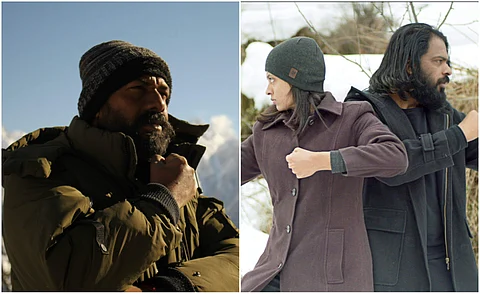

The existence of Abrid Shine's new film was not known to many until a couple of months ago. What’s also surprising is the fact that he made a full-fledged martial arts movie, titled The Kung Fu Master. But then, this is Abrid Shine we are talking about, a director who comes up with fresh and innovative ideas in every film.
Like his contemporary Lijo Jose Pellissery, Abrid doesn’t make the same film twice. 1983 was about the memories of playing cricket in his hometown; Action Hero Biju, a collection of episodes in the life of a police officer; and Poomaram, a documentary-style depiction of a fictional college youth festival.
The Kung Fu Master, at its heart, is a family drama interspersed with multiple fight sequences. It’s a project that has been on Abrid’s mind for a long time. The inspiration came from the martial arts films he saw as a child.
The first martial arts film Abrid saw was Jackie Chan’s Wheels On Meals (1984). He first knew it by its alternate title, Spanish Connection. “I was in the 6th or 7th grade at the time. Jackie Chan was already a big star by then. We celebrated this film in the theatre. Years later, when I searched it on YouTube, I learned that Wheels On Meals is its alternate title. This film gave me such a high that it made me seek out all the Jackie Chan/Jet Li films that came later,” he says.
Interestingly, Kung-Fu Master was the title of the tie-in arcade game that accompanied Wheels On Meals. The game was originally released in Japan as Spartan X, also the title of the movie’s Japanese version.
Abrid is also fond of Bruce Lee films, but his introduction to Lee happened much later, after he grew up. “It amazes me, even to this day, how they pulled off those movies,” says the photographer-turned-filmmaker. He also recalls being awed by Babu Antony’s movies, especially his introduction scene in Moonaam Mura.
The decision to experiment with screenplay structures and genres, he says, is not intentional. He calls it a natural process. “I did 1983 because its emotions were close to my heart. I did Action Hero Biju because Nivin wanted to do a film like that. I had not planned on doing a police story initially. I did Poomaram because I wanted to do a film based on the memories of the youth festivals I attended. The urge to do a martial arts movie came much before working on Poomaram. I want to do a love story someday, but so far I haven’t come across a good story. I would also love to do a period film.”
But irrespective of his familiarity with the material, Abrid likes to put the same effort before making any film. Sometimes he takes a lot of time, as in the case of Poomaram, which was trolled for the multiple delays it went through before its release. But regardless of whether one finds his films to their liking or not, one can’t deny that the end result has always been interesting. “I take time because I can’t make a film just like that and put it out there. It’s easier to do it if it’s someone else’s script or you’re co-writing it. But when you’re creating your own stuff from scratch, a lot of things can happen from the birth of an idea to the formation of the final script. Back in the old days, we had writers like Lohithadas, Padmarajan, Sreenivasan, Sathyan Anthikkad, and MT Vasudevan Nair working on multiple ideas. Some of these prodigies have even written veritable works of literature. So when you’re introducing a film to a public that has been exposed to these works, you have to up your game. You can’t say for sure if you can make a great film, but the effort is important, regardless of the outcome.”
His working process on all his four films has been different. “I think I finished writing 1983 (with co-writer Bipin Chandran) in 5-6 months. There was already a story in place. Action Hero Biju, co-written with Muhammad Shafeeq, took around a year. As for Poomaram, though I started filming immediately, there were some developments along the way. It was borne out of a one-line idea, and it required filming and writing to occur simultaneously. Some improvisations had to be made in terms of the construction of the scenes,” he says.
The Kung Fu Master has Poomaram-fame Neeta Pillai in the lead, in addition to newcomers Jiji Scaria and Sanoop D. Abrid cast fresh faces as he wanted actors who could devote their time. “If I had cast someone who can do 3-4 other films in the time it took us to shoot this film, then it could interfere with our schedules,” explains Abrid.
Neeta, who had impressed everyone with her performance in Poomaram, was cast for her 'power'. “She was getting other offers while training for this, and I told her it was okay to do those first before our film; but since she had already covered some of her training, she felt it would make more sense to finish this first.”
Abrid has already lined up projects for the next five years. He hopes to work faster in the future and do more films in a shorter span if possible.
The Kung Fu Master hits theatres this Friday.